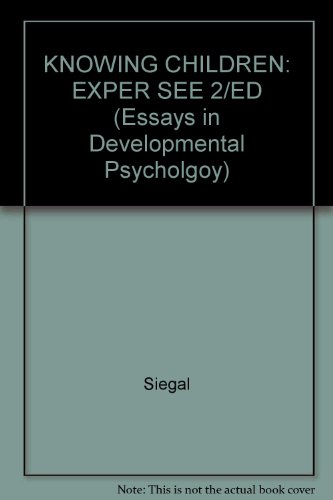Inhaltsangabe
It has been often maintained that young children's knowledge is limited to perceptual appearances; in the "preoperational" stage of development, there are profound conceptual limitations in that they have little understanding of numerical and causal relations and are incapable of insight into the minds of others. Their apparent inability to perform well on traditional developmental measures has led researchers to accept a model of the young child as plagued by conceptual deficits. These ideas have had a major impact on educational programmes. Many have either accepted the view that the young are not ready for instruction, especially in subjects such as mathematics and science. However, this collection of essays provides evidence that children's stage-like performance on the many tasks that have been used to demonstrate their limitations can be reinterpreted in terms of the language used in experiments. In many specialized experimental settings, children may inadvertently perceive adults' well-meaning questions as redundant, insincere, irrelevant, uninformative or ambiguous. Under these conditions, there is a clash between the conversational worlds of children and adults. Children do not share an experimenter's purpose in questioning and how his or her words are intended. They do not disclose the depth of their understanding and may respond to an experimenter's questions incorrectly even when they are certain of the right answer. In this light, a different model of development emerges. It proposes that young children have abstract knowledge that can be examined through attention to their conversational experience. The implications for instruction in subjects such as mathematics and science are significant.
Reseña del editor
It has been often maintained that young children's knowledge is limited to perceptual appearances; in the "preoperational" stage of development, there are profound conceptual limitations in that they have little understanding of numerical and causal relations and are incapable of insight into the minds of others. Their apparent inability to perform well on traditional developmental measures has led researchers to accept a model of the young child as plagued by conceptual deficits. These ideas have had a major impact on educational programmes. Many have either accepted the view that the young are not ready for instruction, especially in subjects such as mathematics and science. However, this collection of essays provides evidence that children's stage-like performance on the many tasks that have been used to demonstrate their limitations can be reinterpreted in terms of the language used in experiments. In many specialized experimental settings, children may inadvertently perceive adults' well-meaning questions as redundant, insincere, irrelevant, uninformative or ambiguous. Under these conditions, there is a clash between the conversational worlds of children and adults. Children do not share an experimenter's purpose in questioning and how his or her words are intended. They do not disclose the depth of their understanding and may respond to an experimenter's questions incorrectly even when they are certain of the right answer. In this light, a different model of development emerges. It proposes that young children have abstract knowledge that can be examined through attention to their conversational experience. The implications for instruction in subjects such as mathematics and science are significant.
„Über diesen Titel“ kann sich auf eine andere Ausgabe dieses Titels beziehen.
